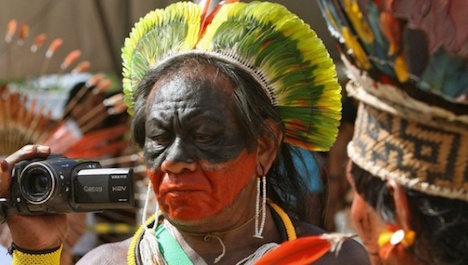In a tersely-worded open letter, Brazil’s Department of Indigenous Affairs Thursday criticized a proposal by two U.S. anthropologists to initiate contact between South America’s most isolated tribes and the scientific community, the Guardian newspaper has reported. Contact with outsiders often results in loss of land, population, and self-determination for Amazonian tribes The professors, the University of Missouri’s Robert Walker, and Arizona State University’s Kim Hill, argued in an article published last year in Science Magazine that the continuing isolation of the estimated 50 to 100 Brazilian tribes who’ve had little or no contact with the outside world is not viable in the long term,” and proposed that “controlled contact is the only possible strategy for protecting these people.” But in Thursday’s published letter, 18 scientific experts with Brazil’s Department of Indigenous Affairs, known by the Portuguese acronym, FUNAI, said contact with the outside world carries far greater risk than does isolation. Lost Indigenous tribes are vulnerable to disease such as measles and flu, and history has shown that contact with outsiders often leads to loss of land and other resources and a loss of political autonomy. The Amazonian Kawahive tribe, for example, has lost nearly half its population over the past 30 years, the FUNAI scientists wrote. “It is worth remembering that the practices Brazil adopted during the intense economic expansion of the 1970s and 1980s resulted in widespread disintegration and population loss for indigenous peoples who, until then, had been uncontacted,“ read the letter. In last year’s Science Magazine article, Hill and Walker disagreed with the “leave them alone policy.” While acknowledging “poorly planned contact” with Amazonian tribes led to indigenous deaths historically, the anthropologists wrote that “conceiving a well-organized plan” could help avoid “disastrous contacts.” They wrote, “Controlled contact is better than no contact.” The FUNAI experts said such a strategy did not respect uncontacted tribes’ wish to be left alone and was a “violation of these people’s rights to determine their own lives”. The London-based human rights group Survival International which is lobbying the Brazilian government to enforce constitutionally-protected land rights ahead of next month’s Olympics, agreed with the FUNAI position, and described the views articulated in Science Magazine as “dangerous and misleading.” “Their message is very credible,” said Sarah Shenker, Brazil campaigner for Survival told the Thomson Reuters Foundation. “They are the ones on the ground seeing what goes on in places where there is contact." Source URL |
